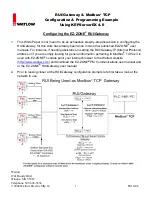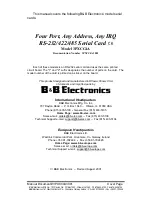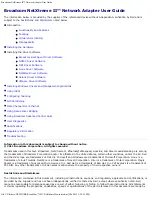
6
MANUAL P/N 900000111 REV K
1
Introduction
The NFS220 is a precision time and frequency standard that uses the Global Positioning System (GPS).
It is designed for use in WI-FI, Wi-Max, satellite communications, telecommunications and military
communication applications.
The NFS220 utilizes a high performance 16 channel GPS receiver. An automatic position-averaging feature
enables the best use of GPS when operating in a fixed location.
The NFS220 is fitted with an internal back up oscillator that is continuously calibrated to GPS using an
advanced algorithm, providing optimal frequency control of the oscillator. This ensures that the highest time
and frequency accuracy is maintained if no satellites can be tracked, and ensures an ultra stable, low noise
frequency reference.
The basic NFS220 includes a precision OCXO frequency standard, while TCXO and Rubidium oscillators
are available options that offer a variety of price and performance options. An option with a low noise OCXO
phase locked to a Rubidium is also available, combining the low noise characteristic of the OCXO with the
long term stability of a Rubidium oscillator.
The NFS220 provides “at a glance” status indication via front panel LED’s and can be integrated with other
management systems using Ethernet and serial ports.
The NFS220 provides simple integration into military platforms by allowing synchronization from Have Quick
time code, which is available on military SA-ASM GPS receivers such as the DAGR(AN/PSN-13) or
PLGR(AN/PSN-11). The NFS220 also generates Have Quick and 1PPS signals compatible with ICD-GPS-
060.
The integrated Ethernet interface provides Network Time Protocol (NTP) synchronization to other connected
computers. In addition to NTP, the NFS220 Ethernet interface contains a built-in web server that allows the
NFS220 to be controlled using a standard web browser such as Internet Explorer or Chrome. Simple
Network Management Protocol (SNMP) allows easy integration of the NFS220 with industry standard
network management systems.
The NFS220 provides three 1PPS time mark outputs. A unique feature allows precise controlled delays to
be inserted into these outputs to compensate for cable- and other propagation delays. Compensation delay
is independent for each output and has <1ns resolution.
Serial time code outputs are provided to allow time synchronization to be distributed to computers, displays,
and other equipment requiring precision time. Two outputs are dedicated to Have Quick time code. Two
outputs (one modulated, one DC level shift) may be user selected from IRIG A, IRIG B, IRIG E or IRIG G.
Four low phase noise 10 MHz sine wave outputs from the disciplined oscillator are provided. Signal
amplitude is able to be set using the software available.
All outputs are provided with activity detectors. Loss of any output is indicated by means of an individual
front panel alarm LED as well as through the network interface or a discrete alarm output.







































